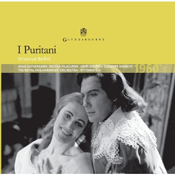By that time she knew where each note should be placed and how
to make it land there, how to prepare, how to hold back, when to launch, what
would make her tired, what she could get away with. Even so, on the first night
of the run, she was visibly exhausted at the final curtain, grateful for our
ovations but more grateful that it was over. By the final performance she was
in clover, dancing on the stage (after the repeat of the cabaletta, too!),
extracting individual roses from the bouquet she’d caught to bestow one
on Pavarotti, another on Bonynge. Then, laughing, she tossed a few our way and
blew us kisses. Of course, by then, I knew her first commercial recording of
the opera, the one from 1963 with Pierre Duval shrilling those wild falsetto
E’s to try to match her in the duet.
But the recording at hand, from Glyndebourne in 1960, is her first essay at
the role. Although Nicola Filiacuridi is by no means disgraceful as Arturo (he
simply omits the highest phrases, allowing Sutherland to take them alone) and
John Kentish sings “Ah! per sempre io ti perdei” with enviable
velvet, purchasers of this set will be Sutherland fans eager to hear her first
attempt on the part. They won’t be disappointed, but this won’t be
the Elvira they remember.
There is the omission of the final cabaletta, “Ah! sento al mio
bell’angelo” for one thing. The number was a Bellini afterthought
in any case, and Muti and other “prima la littera” conductors have
preferred to do without it. The finale may sound strange to those familiar with
the Bonynge version, for there is not a peep from the soprano through the
entire concluding rejoicing.
But that’s not significant. What is fascinating is that, throughout
the performance, Sutherland is not sure of herself when she goes for
the E-flats and D’s. A friend of mine used to scoff at those of us who
only heard her in the seventies and eighties: “The chances she used to
take! She was fearless!” He referred particularly to a
Puritani he had heard her sing with the American Opera Society. That
may be the most exciting pirate Puritani to have; I don’t know
if it’s even available.
Glyndebourne was not her first exposure to the music, at least of the Act II
Mad Scene. She had studied that in her first days of working with Bonynge, her
first approaches to bel canto; famously she sang it as part of her audition for
Covent Garden—to the management’s bewilderment. They thought they
were getting a dramatic soprano, which had been her stated objective hitherto;
they had no experience of a dramatic coloratura. Aside from Callas, who had
performed Puritani with Serafin in Venice a few years earlier but was
unknown in London, no one had. The revival and renewal of this repertory seemed
a very long shot to anyone in the business. They had no idea what to make of
Sutherland, and they made very little for several years.
Sutherland’s first Bellini role was, notoriously, Clotilda to
Callas’s first Norma at Covent Garden. Glyndebourne, where she had
earlier sung Donna Anna, the Countess and Madame Hertz in Der
Schauspieldirektor, was her first crack at any Bellini lead. She is strong
here in the angry music of her duet in scene 2 and her voice has the heavier
quality, what I call the “golden” voice, that would become most
familiar to the world by the end of the decade. The “silver” voice
appears with “Son vergin vezzosa” in scene 3, and it is here that
she seems tentative, as if she could not as yet believe that it was easy to
sing this music. It wasn’t easy for anybody else, after all. She does not
seem certain when she glides to the top of a run that the proper note will come
out, and she is therefore audibly nervous about putting full weight on it.
There is a flutter where we are used (in Sutherland Elviras) to certainty. But
this is not inappropriate to the airy, fantastical nature of Elvira Walton in
these early scenes.
Where Sutherland comes into her own is the often ignored first Mad Scene,
the one at the conclusion of Act I, beginning with “Oh! vieni al
tempio.” This is as exquisite a piece of simple singing as she ever did,
caressing the line, breathing it, without overdoing the melodrama of the
situation. (The choral comment takes care of that.) Too, admirers will treasure
the different qualities she brings to Elvira’s changes of mood in Act
II—and regret Maestro Gui’s decision to cut repeats and what would
no doubt have been extraordinary bursts of ornament. The very highest points of
the Act III duet are marked by a certain effort to scoop up to the note that
will be faulted by purists, and this tendency, alas, would become the rule in
her last decade of singing. By the time she sang Puritani at the Met
for the last time, late in 1986, her performance was somewhat painful to those
who remembered her great days. She still sang much of it beautifully (and had
the sense to lower the line here and there), but the lazy pitch and rhythm were
considerably more marked. She was no longer herself, and she no longer seemed
to be enjoying herself singing it.
It is fascinating, as well as a vocal delight, to have this document of her
first essay. Dare one hope that her Mozart essays also linger somewhere in the
Glyndebourne archives?
John Yohalem
